|
|
|
Sort Order |
|
|
|
Items / Page
|
|
|
|
|
|
|
| Srl | Item |
| 1 |
ID:
130024
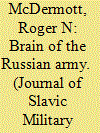

|
|
|
|
|
| Publication |
2014.
|
| Summary/Abstract |
Following the Russia-Georgia War in August 2008, Russia's conventional Armed Forces were subjected to a far reaching and unpredictable reform. Although the Armed Forces were long overdue reform, previous efforts rapidly failed for a variety of reasons including institutional inertia, in-fighting within the military elite and a lack of consensus on the goals and targets of such reform. The reforms of 2008-12 were therefore unprecedented since the creation of Russia's Armed Forces in 1992 following the disintegration of the USSR in late 1991; major changes were actually implemented. Yet, the reforms that followed were haphazard, poorly implemented and frequently experienced setbacks, reversals and an overall lack of coordinated policy efforts. These issues are examined in the following paper, exploring the roots of Russian defense planning weaknesses, and the numerous policy zigzags of the reforms to the structure of the Armed Forces, officer downsizing, NCO development and many other issues within a political-military culture that actually mitigates time-phased and fully worked-out planning cycles. Moscow's blindness to the utility of reliable military statistics will ensure continued 'blind planning' and institutional guesswork until obsessive secrecy and state level corruption give way to more scientific approaches to forming, implementing and managing such strategic level change within the country's defense and security structures.
|
|
|
|
|
|
|
|
|
|
|
|
|
|
|
|
| 2 |
ID:
057665
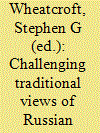

|
|
|
|
|
| Publication |
New York, Palgrave Macmillan, 2002.
|
| Description |
xxi, 242p.: table, figure, maps.Hbk
|
| Series |
Studies in Russian and East European History and Society
|
| Standard Number |
0333754611
|
|
|
|
|
|
|
|
|
|
|
|
Copies: C:1/I:0,R:0,Q:0
Circulation
| Accession# | Call# | Current Location | Status | Policy | Location |
| 046594 | 947/WHE 046594 | Main | On Shelf | General | |
|
|
|
|
| 3 |
ID:
102103
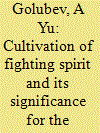

|
|
|
|
|
| Publication |
2010.
|
| Summary/Abstract |
This is a review of the book by A.K. Baiov History of Russian Military Art. It shows the essence and importance of the formation of fighting spirit in the Russian Army in history.
|
|
|
|
|
|
|
|
|
|
|
|
|
|
|
|
| 4 |
ID:
038556
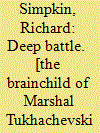

|
|
|
|
|
| Publication |
London, Brassey's Defence Publishers, 1987.
|
| Description |
xii, 281p.: ill.Hbk
|
| Standard Number |
0080311938
|
|
|
|
|
|
|
|
|
|
|
|
Copies: C:1/I:0,R:0,Q:0
Circulation
| Accession# | Call# | Current Location | Status | Policy | Location |
| 027406 | 923.547/SIM 027406 | Main | On Shelf | General | |
|
|
|
|
| 5 |
ID:
140769
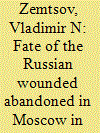

|
|
|
|
|
| Summary/Abstract |
The article is devoted to one of the most tragic episodes of the Patriotic War of 1812 (Napoleon’s Russian campaign), associated with a massive loss of Russian wounded in Moscow. For 200 years the participants of the events and historians have expressed many opinions about the causes, culprits of the tragedy, and the number of victims. Based on the integrated use of currently available sources, bringing previously unknown documents from the Russian and French archives, the author has tried to give convincing answers to the key questions of the theme. In his opinion, the retreating Russian army left in Moscow from 10,000 to 15,000 sick and wounded soldiers, of which at least 8,000 died or were taken prisoner. Some of the dead (about 1,000 people) were victims of fire, initiated by Moscow authorities headed by Governor-General F. V. Rostopchin. Causes of death for the greater part of the wounded and sick were associated mainly with the lack of medical care and food.
|
|
|
|
|
|
|
|
|
|
|
|
|
|
|
|
| 6 |
ID:
161009
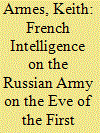

|
|
|
|
|
| Summary/Abstract |
This article examines the reports on the Russian army by the French military attachés in St. Petersburg to the General Staff in Paris and the intelligence estimates compiled by the Russia specialists of First Bureau (Allied Armies), 1904–14. Officers seconded to the Russian army reported on the remarkable progress made after the war with Japan. French intelligence indicated any Russian offensive against Germany would occur only after the decisive battles in the west and would only tie down limited German forces. The Russian success at the start of the war and resulting transfer of German forces from the Western Front therefore were unexpected by the French General Staff.
|
|
|
|
|
|
|
|
|
|
|
|
|
|
|
|
| 7 |
ID:
089330
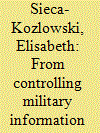

|
|
|
|
|
| Publication |
2009.
|
| Summary/Abstract |
This article demonstrates how the Russian state's reconstruction of the communication network for the armed forces and information services served two purposes: firstly, to silence the free media and exert control of information on a nationwide level, and secondly, to draw upon the armed forces to reinforce its patriotic discourse. The relative liberalization of the media in the early 1990s led to a media defeat of the Russian army during the First Chechen war. Consequently, in the second war, renewed control of the media was progressively established, the goal of which was to deny access to independent journalists, on one hand, and to set up a more efficient communication network, on the other. This restructured network encompassed the internal network of the armed forces but was also destined to serve the outer civilian world - the Rosinformtsentr was created to this end. The implementation of these measures intensified over the summer of 2000, finally culminating in the adoption of the Information Security Doctrine, the revamping of military media and the placement of siloviki members in certain media posts. By putting the army back on center stage and giving it a prominence that it had lacked ever since the end of the USSR, the government attempted to mobilize society around a nationally sanctioned idea. The army, which easily fell into its historically familiar role, which it had actually never fully relinquished, has been able to easily reactivate this military-patriotic tendency in the public and to thus propagate a form of traditional military thinking that tends to be resistant to reform.
|
|
|
|
|
|
|
|
|
|
|
|
|
|
|
|
| 8 |
ID:
126980
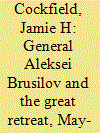

|
|
|
|
|
| Publication |
2013.
|
| Summary/Abstract |
General Aleksei Brusilov's fame rests on his successful offensive in 1916, yet he had many other career triumphs. One was his auspicious leadership of the VIII Russian Army during the 'Great Retreat' of 1915, when his skillful generalship was a major factor in preventing the total rout of the Southwestern Russian front. Although he retreated with other armies, he took thousands of Austrian and German prisoners in doing so and eventually launched at the end of his own offensive, which gave the enemy quite a bloody nose. The successes he had in 1915, which have generally gone unnoticed by historians, displayed the leadership qualities he so well demonstrated in his great victory of 1916.
|
|
|
|
|
|
|
|
|
|
|
|
|
|
|
|
| 9 |
ID:
133761
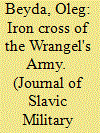

|
|
|
|
|
| Publication |
2014.
|
| Summary/Abstract |
This article is based on little-known sources and unpublished documents and traces the fates of some White Army veterans, who during WWII served in the German Army, holding a rank of sonderführer. Some of them were evacuated to Gallipoli from Crimea in November 1920 (gallipoliytsy). The topic of Nazi administration attitude toward the use of Russian emigrants on the front is also touched upon. Special attention is given to the biographies of Russian emigrant interpreters in the 9th Army of the Wehrmacht. It is concluded that the final aims and motivation of Nazis and White émigrés were different. Realization of that contradiction helps the researcher to understand why a part of Russian military emigration had chosen collaboration and joined Hitler's 'crusade against Bolshevism'.
|
|
|
|
|
|
|
|
|
|
|
|
|
|
|
|
| 10 |
ID:
133634
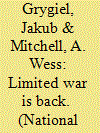

|
|
|
|
|
| Publication |
2014.
|
| Summary/Abstract |
EUROPE NEEDS to rearm and defend itself to cope with a new military threat. The American security umbrella-in both its conventional and nuclear forms-is no longer adequate, particularly on NATO's vulnerable eastern flanks. Indeed, the extended deterrent provided by the United States to its most exposed allies may not be well suited to inhibiting attacks similar to Russia's recent incursion into Ukraine, which displayed all the hallmarks of the newly popular limited conventional wars-brief and decisive, violent and yet very restrained. The purpose of such conflicts is to achieve a quick fait accompli in a geographically circumscribed area through limited force-in this case, paramilitary means followed by Russian regular forces. It is difficult to deter such a threat through the promise of retaliation, which by its very nature must occur after the facts on the ground have already been changed. A threat of retaliation is simply less credible when the enemy has achieved his objective through a low-intensity action. What are needed instead are strong local military capabilities-a preclusive defense-that increase the costs of that limited attack. Europe must start to defend its border rather than indulge in the belief that the traditional formula for deterrence, based on retaliation and the extended deterrent provided by the United States, will suffice. It won't.
|
|
|
|
|
|
|
|
|
|
|
|
|
|
|
|
| 11 |
ID:
130026
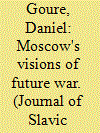

|
|
|
|
|
| Publication |
2014.
|
| Summary/Abstract |
Like the United States and NATO, Russia is struggling to define the future security environment and shape a course to the creation of a relevant and effective military. Russia's strategic vision is of an uncertain, complex and quite dangerous word with threats ranging from internal subversion through intercontinental nuclear exchanges. The Russian military faces an impossible dilemma. It must address a broadening spectrum of prospective conflict scenarios with inadequate resources leading inevitably to the fielding of inadequate capabilities. One reason that Russia clings so tenaciously to nuclear weapons is its recognition that it is the nation's central, even the sole, source of political relevance and military power.
|
|
|
|
|
|
|
|
|
|
|
|
|
|
|
|
| 12 |
ID:
130034
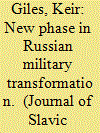

|
|
|
|
|
| Publication |
2014.
|
| Summary/Abstract |
Fundamental reform of Russia's military has passed through a number of distinct phases since its inception in late 2008. This paper describes the phase of consolidation and stability begun in early 2011. Based on research to June 2012, and pre-dating the replacement of Anatoliy Serdyukov as Russian Defence Minister, the paper shows how early planning and forecasting deficiencies were addressed from 2011 onward, with continuing support at the highest level for the overall aims of military reform. Ongoing problems such as procurement and manpower are discussed as serious challenges to Russian military aspirations, and further specific challenges affecting each individual arm of service are described. In conclusion, Russia's new military capabilities, and the state's rationale for introducing them, are considered.
|
|
|
|
|
|
|
|
|
|
|
|
|
|
|
|
| 13 |
ID:
153978
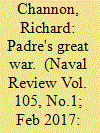

|
|
|
| 14 |
ID:
131183
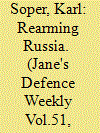

|
|
|
|
|
| Publication |
2014.
|
| Summary/Abstract |
Russia's rearmament ambitions envisage the replacement of some 70% of its old equipment by 2020, but current funding levels suggest it will fall well short of this goal.
|
|
|
|
|
|
|
|
|
|
|
|
|
|
|
|
| 15 |
ID:
130033
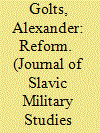

|
|
|
|
|
| Publication |
2014.
|
| Summary/Abstract |
Two years ago president Dmitry Medvedev and Minister Anatoly Serdyukov stated that military reforms are 'practically' complete. It looks premature now. Serdyukov managed to fulfill only 'quantitative' part of reforms. The 'Serdyukov' reforms will follow the path typical of the majority of Russian reforms. They focus on meeting certain formal measures and characteristics (in the case of military reform, this includes the size of the armed forces, the number of units, the new structure and so on) and, at the same time, avoid making decisions that would require radical changes in the country's political and social life.
|
|
|
|
|
|
|
|
|
|
|
|
|
|
|
|
| 16 |
ID:
130860
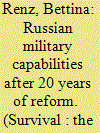

|
|
|
|
|
| Publication |
2014.
|
| Summary/Abstract |
Despite widespread perceptions, Russia is close to having the military it needs. In the aftermath of the Cold War, the leaders of the Russian Federation faced the unenviable task of creating national armed forces using what was left of the Soviet military. Plans to provide 'traditional' defence and to meet future challenges were considered as early as 1992, leading to a string of reform programmes over the next two decades. Such efforts were closely observed by analysts in the West and Russia, who documented the drawn-out process in a large body of literature. The assessments provided in the bulk of these works were almost unanimous: the reforms had failed, leaving the Russian armed forces 'impoverished, demoralized and largely ineffective', 'woefully inadequate to address the country's security threats' and standing 'perilously close to ruin'.
During the presidency of Boris Yeltsin, the reforms were seen as botched jobs that merely reduced troop numbers, essentially leaving Russia with a smaller version of a Soviet-style, mass-conscription army. The latest push for change, announced in the wake of the country's 2008 war with Georgia, during which the performance of the Russian military was widely criticised, met with a warmer reception, at least initially. It envisaged a comprehensive shift away from low-tech to high-tech; from conscription to professionalism; and from mass to mobility. Some structural changes, such as the transition from divisions to brigades and the streamlining of central command, were executed with impressive speed, raising expectations that Russia was finally on its way to acquiring a 'modern' military. As time went on, however, observers noted a range of problems that, in their eyes, dampened the prospect of ultimate success. The Russian defence industry remained unable to produce advanced equipment. The possibility of ending conscription and moving towards an all-volunteer force seemed to be as remote as ever. Moreover, the 2010 military doctrine continued to emphasise mobilisation, instead of focusing on permanent readiness and rapid reaction. When Defence Minister Anatoly Serdyukov was replaced by Sergei Shoigu - a long-standing ally of Russian President Vladimir Putin - in November 2012, some experts argued that the 2008 reforms were in effect 'dead'.
|
|
|
|
|
|
|
|
|
|
|
|
|
|
|
|
| 17 |
ID:
142959
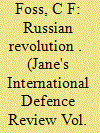

|
|
|
| 18 |
ID:
131190
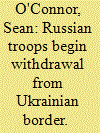

|
|
|
|
|
| Publication |
2014.
|
| Summary/Abstract |
Russian forces close to Ukraine's border appear to be drawing down or relocating, HIS Jane's satellite imagery analysis indicates
|
|
|
|
|
|
|
|
|
|
|
|
|
|
|
|
| 19 |
ID:
102836
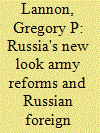

|
|
|
|
|
| Publication |
2011.
|
| Summary/Abstract |
In December 2009 the first stage of an ambitious military reform of the Russian Federation's army was implemented: the former Soviet, and post-Soviet, four-tiered command structure: military district-army-division-regiment, was replaced with a three tiered command structure: military district-army-brigade. In this process, the brigade replaced the division as the primary tactical unit in the Russian army, and most "cadre-strength" units, partially manned divisions which would be brought up to full strength with reservists in wartime, were eliminated as well. These reforms effectively put an end to the mass-mobilization army that formed the basis of the Tsarist Army and its Soviet and Russian successors since 1874. These reforms are obviously of enormous military importance, but they may also provide insight into how Russia's elites perceive external and internal threats to the Russian Federation, and how Russia currently fits into the contemporary world community. In this light, these reforms may provide support for Russian adoption of a more regionally based-and less global-foreign policy, one that is focused more on what Russian diplomats refer to as "Southern" threats than either possible threats from the North Atlantic Treaty Organization to the West or the Peoples Republic of China to the East.
|
|
|
|
|
|
|
|
|
|
|
|
|
|
|
|
| 20 |
ID:
125070
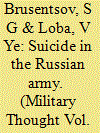

|
|
|
|
|
| Publication |
2013.
|
| Summary/Abstract |
The paper looks at the history of suicide cases in the Russian Army, their causes and ways of dealing with the problem.
|
|
|
|
|
|
|
|
|
|
|
|
|
|
|
|
|
|
|
|
|